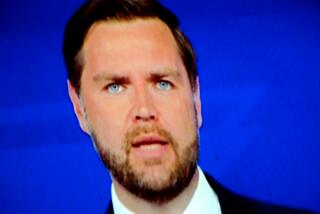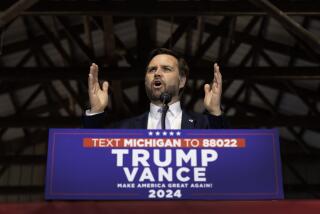Doyle McManus: Tim Pawlenty’s gambit
- Share via
Last week’s Republican mini-debate may not have been the most auspicious way for a presidential candidate to introduce himself to a national audience. The stage in South Carolina didn’t include most of the party’s top names; instead, it boasted former Pennsylvania Sen. Rick Santorum, who wants to focus on gay marriage; Atlanta pizza magnate Herman Cain, who wants to run the government like a business; Rep. Ron Paul, the vinegary Texas libertarian; and Gary Johnson, a former governor of New Mexico who hopes to be the next Ron Paul. “It looked like the bar scene from ‘Star Wars,’” said Republican strategist Scott Reed.
But there was also Tim Pawlenty, the former governor of Minnesota, a thoroughly conventional conservative, looking a little lonely in his normalcy.
Unlike the others, Pawlenty didn’t set off fireworks. He didn’t condemn politicians as a class, as Cain did to loud applause, or propose privatizing Medicare instantly, as Santorum did to less applause. Pawlenty marched a little plaintively through his mainstream conservative talking points: cut federal spending, get the government out of the way of business, repeal the Obama healthcare law, “restore America’s promise.” A focus group of GOP voters convened by Fox News said Pawlenty made no vivid impression; the candidate they liked most was Cain.
Yet the decidedly bland and uncharismatic Pawlenty stands a good chance of being the Republicans’ next candidate for president. And he might even turn out to be a pretty good nominee, with his message focused steadfastly on the issues that helped Republicans win last year’s congressional elections: low taxes, spending cuts, less regulation.
How could Pawlenty, who currently gets the support of roughly 5% of Republican voters on a good day, win the nomination? Mostly by process of elimination.
Every potential Republican candidate has flaws. Former Massachusetts Gov. Mitt Romney, the putative front-runner, is distrusted by many conservatives for his moderate past, especially for passing a healthcare law that looks suspiciously like “Obamacare.”
Some of the most intriguing potential candidates — real estate mogul Donald Trump, former Alaska Gov. Sarah Palin, former House Speaker Newt Gingrich — draw negative reactions from big chunks of the electorate. Some of the most electable — former Arkansas Gov. Mike Huckabee, Indiana Gov. Mitch Daniels — sound as if they don’t plan to run. By showing up in South Carolina, Pawlenty showcased one of his main strengths at the moment: He’s actually running.
So despite the long list of potential names on the ballot, the race could quickly turn into a two-man contest, Romney versus Pawlenty. And in that matchup, Pawlenty stands a good chance of winning as the most plausible candidate acceptable to conservatives.
Pawlenty’s more interesting than he looks. “He was the most conservative governor we’ve ever had,” said Lawrence R. Jacobs of the Hubert H. Humphrey Institute of Public Affairs at the University of Minnesota. Jacobs, who’s not a Republican, gives Pawlenty credit for governing as “a thoughtful conservative,” a policy wonk who reduced spending on healthcare through programs that pushed hospitals and other providers to become more efficient.
Of course, Pawlenty’s record has flaws too. He boasts of closing state deficits without raising income taxes, but he did that partly through short-term budget gimmicks that created problems for his successor. He was a strong advocate of cap-and-trade measures to reduce the emission of greenhouse gases, a position he has recanted during his presidential campaign because it’s apostasy to most of his party.
And then there are his occasional lapses into oddly juvenile vulgarity; he boasted to several audiences about his “red-hot, smoking wife,” and he told a radio interviewer that he suspected that when President Obama needed to make a decision about striking at terrorists, “he’s looking for a pair of Depends.”
Now, running for the nomination, he is tacking hard to the right, sounding more conservative than ever in an apparent attempt to win the hearts of “tea party” adherents. At a tea party convention in March, he brandished a copy of the Constitution, denounced the Federal Reserve for issuing “fiat money” and praised his audience “for standing up to the ruling class.”
Pawlenty has called on Congress to refuse to increase the federal government’s debt ceiling under any circumstances, a tea party position that puts him to the right of most Republican leaders in Congress, who have said they’ll accept a compromise. (He has, though, allowed himself some wiggle room, saying he’d look at any compromise that’s struck.)
“He’s dumbing-down his own positions,” said Jacobs.
Pawlenty is also emphasizing his social conservative positions more than he did as governor of Minnesota and talking more about his Christian faith — a legitimate subject but also one that reminds evangelical voters that he’s not the Mormon in the race.
Pawlenty’s candidacy poses an intriguing fundamental question about American presidential elections: Does charisma matter?
Political scientists tell us no. More important, they say, are the party’s message, the voters’ mood, the state of the economy and the context of events. The candidate’s star power is only a secondary factor.
If the political scientists are right, the ineloquent son of a truck driver from South St. Paul could surprise doubters and prove to be a serious contender for the Republican nomination — and, if the economy stays weak, a serious challenger to Obama as well.
More to Read
Sign up for Essential California
The most important California stories and recommendations in your inbox every morning.
You may occasionally receive promotional content from the Los Angeles Times.











